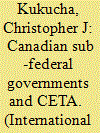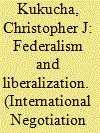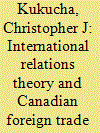|
|
|
Sort Order |
|
|
|
Items / Page
|
|
|
|
|
|
|
| Srl | Item |
| 1 |
ID:
124723


|
|
|
|
|
| Publication |
2013.
|
| Summary/Abstract |
Canadian provinces and territories have gained increasing relevance in matters of international trade over the last several decades. The possibility of a Canada-European Union Comprehensive Economic and Trade Agreement, however, marks the first time that sub-federal governments in Canada have been directly involved in specific areas of negotiations. The significance of this development, examined in this series of policy papers, can be organized under five overarching themes: 1) the negotiation, ratification, and implementation of foreign trade agreements; 2) the need to distinguish between process activity and actual policy outcomes; 3) the ongoing relevance of Canadian federalism; 4) the impact of non-governmental actors, especially civil society; and 5) the differing interpretations of academics, practitioners, business, and societal groups.
|
|
|
|
|
|
|
|
|
|
|
|
|
|
|
|
| 2 |
ID:
153187


|
|
|
|
|
| Summary/Abstract |
This article argues that federal systems in Canada and the United States allow for the successful pursuit of sub-federal offensive and defensive priorities in the negotiation of international trade agreements. It is also clear, however, that the coercive American intrastate system limits the relevance of American states in this process, especially when compared to Canada’s relatively cooperative interstate model. Canadian provinces and territories also benefit from ideational considerations, including policy expertise and trust-ties with federal negotiators, which further strengthens sub-federal legitimacy and influence in this policy area. This study evaluates the incremental and significant impact of Canadian and American sub-federal governments across a number of sectors on the negotiations and final legal texts of the Canada-Korea Free Trade Agreement, the Canada-European Union Comprehensive Economic and Trade Agreement, and the Trans-Pacific Partnership.
|
|
|
|
|
|
|
|
|
|
|
|
|
|
|
|
| 3 |
ID:
134664


|
|
|
|
|
| Summary/Abstract |
This study evaluates the application of international relations theory in the Canadian foreign trade policy literature. It determines that studies can now be categorized into several groups, including: traditional power-based approaches; the content and negotiation of international trade agreements; the globalization of public policy; federalism and international trade; North American integration; and alternative approaches and new directions. For the most part, however, international relations theory is applied unevenly and implicitly in studies of Canadian foreign trade policy, if at all, with an emphasis on realist and neo-liberal approaches highlighting Canada as a principal, dependent, or middle power. It is argued that a greater emphasis on international relations theory, focusing on the level-of-analysis problem, non-state actors, and normative considerations, would improve the understanding and evaluation of Canada’s global trade relations for academics and practitioners.
|
|
|
|
|
|
|
|
|
|
|
|
|
|
|
|
|
|
|
|
|